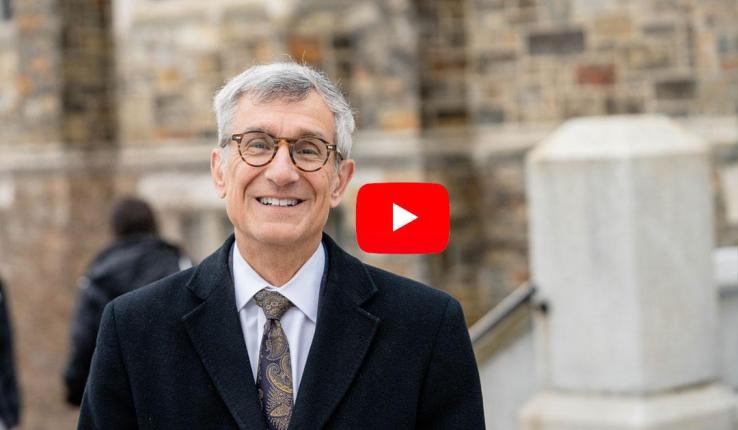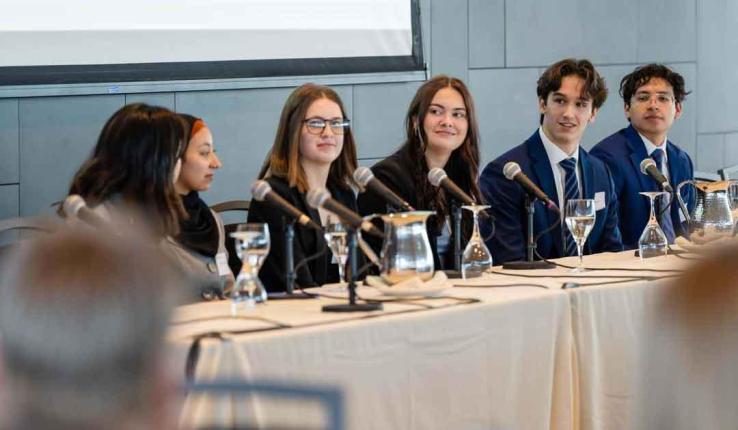After months-long group work and in-depth discussions among faculty, students and staff, Lehigh on Thursday released its draft framework for a new strategic plan that focuses on innovation and risk-taking, defines and addresses important intellectual and societal challenges, and cultivates collaborations and partnerships that amplify Lehigh’s global and regional impact.
In a 90-minute “campus conversation” for students, faculty, and staff held in-person in Iacocca Hall on the Mountaintop Campus and over Zoom, Lehigh Provost Nathan Urban laid out the framework for the plan that is tentatively titled “Inspiring the Future Makers.” The university is expected to finalize and announce the plan in June.
At the start of his presentation, Urban asked: What do we want Lehigh to be as a result of this strategic plan and the work that gets done in association with it?
“We want Lehigh University to be a premier residential research university where students, faculty and staff are future makers and future-makers,” he said, articulating the plan’s draft vision statement. He read the rest of the draft statement, shown on slides, that also included providing students with an experience that embraces the intersection between technology and humanity because, Urban said, “that is what the future needs.”
Draft Goals
In having collected, read through and reorganized 80-plus pages of material from the four working groups involved in the process, and having had many conversations with stakeholders, Lehigh has identified three goals as a starting point in drafting the plan, Urban said.
The goals call for Lehigh to innovate, create, take risks and spark curiosity to become a leader in discovery and learning; to break boundaries to define and address the most important intellectual and societal challenges; and to cultivate collaborations and partnerships that build community, foster a sense of belonging, and amplify Lehigh’s global and regional impact.
“As we're trying to transition from these overarching ideas to what it is that we actually want to achieve, I think we want to think big,” Urban said. “We want to think and discuss—discover—how we can be a leader in these domains, not just a participant.”
Measuring Success
What might success look like? Urban asked, before outlining a number of potential measures of Lehigh’s success in following its strategic plan.
Among the examples he provided were:
—Lehigh would double its research activity
— A significant number [or 20%] of graduating students in the next five years would earn a degree from a program that does not exist today.
— Lehigh would lead the country in graduation rates and long-term return on investment.
— A percentage of undergraduates would take “a semester of exploration” rather than initially affiliate with a college.
Lehigh began its strategic planning process six months ago. President Joseph J. Helble ’82, in his opening remarks at Thursday’s event, reflected on the deep engagement of the Lehigh community in the process. “And that has made a tremendous difference in the generation of ideas and the rich discussions that have ensued,” he said.
Vice President of Strategic Planning and Initiatives Chris Cook said that 74% of the faculty, 52% of the staff, 17% of undergraduate students and 14% of graduate students have participated.
Four themes have guided the work thus far: Education with Purpose, Lehigh User Experience, Research with Impact and Smart Growth. Those groups have finalized their work.
As part of the initiative, participants also identified hurdles to achieving goals, with Lehigh taking steps to address them. For example, bus transportation was identified as not meeting the needs of those traveling to and from the Mountaintop and Goodman campuses. In response, Transportation Services launched pilot routes in January 2023 to enhance the user experience. Further refinement will continue.
The campus community is invited to attend additional Q&A sessions over the next two weeks to provide feedback and seek clarification on the draft plan.
A recording of the campus conversation will be available to students, faculty and staff in the Idea Portal.





